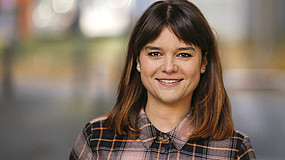HSZG PhD student talks about everyday racism in professional collaboration with people with migration experience.

People with migration experience could increasingly work as professionals in health and care facilities. "When dealing with colleagues and clients, however, there are also challenges that make cooperation with the majority society more difficult," says Monique Ritter M.A. She talks about everyday racism "or racist practices in the capillary hairline paths of everyday life."
Monique Ritter is a lecturer for special tasks in the Social Work degree program and a doctoral candidate at the HSZG. As part of a cooperative doctorate between Zittau/Görlitz University of Applied Sciences and Chemnitz University of Technology, she is working on the reconstruction of practices of exclusion and paths to inclusion in professional cooperation with people with migration experience in outpatient care in the Dresden area.
She was recently invited by the German Red Cross Saarland Regional Association as a speaker on organizational development critical of racism. On March 29, 2021, she will give an online lecture on the topic area 'Refugees in the field of nursing care'.
"In it, I am primarily investigating the question of which everyday racist practices can occur in professional cooperation with people with experience of flight and migration in outpatient care and how they camouflage themselves in everyday life," announces the doctoral student.
”It would also like to show ways in which institutions can embark on the path towards organizational development that is critical of racism.
To answer this question, Monique Ritter likes to quote the post-colonialization theorist Achille Mbembe. In his words: "...where they are found in seemingly harmless everyday gestures, on the way via a nothing, a seemingly unconscious remark, a joke, an allusion or suggestion, a lapse, a joke, a connotation and, let us not conceal this, a deliberate malice, a bad intention, a deliberate kick or punch, an obscure wish, to stigmatize and above all to use violence, to hurt and humiliate and to defile those who, in our eyes, do not belong to us", he describes racist nano-practices and experiences that are constantly directed against those who supposedly do not belong and are usually not questioned or even trivialized by the established majority society.
How do these conscious and unconscious as well as unquestioningly reproduced practices of exclusion manifest themselves in people's everyday lives? What role do the after-effects of colonialism, long forgotten and repressed in everyday discourse, play? What does the whole thing have to do with social situation and organization and why do people still talk about 1990 or are they talking about it again? How can all this be thought of together and better understood? Monique Ritter M.A. deals with these interdependencies in her dissertation research in the Dresden area and asks what situation people with migration or refugee experience after the so-called 'long summer of migration' (post 2015) encounter in everyday working life as employees in the professional context of care.
"Organizational development that is critical of racism shows itself to be a necessity that understands racism as a reality-constituting and reality-structuring network in which we are all - more or less - entangled and that understands criticism not as a reprimand or assignment of blame, but in the Foucauldian sense as the art and the striving not to be governed in this way - by a structure that is always already in place," describes Monique Ritter.
”The doctoral candidate advocates such a rethink at both a societal and organizational level.

